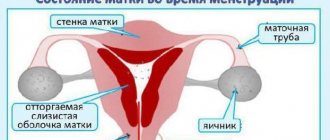Before the onset of menstruation, the female body undergoes hormonal changes, which negatively affect mood, metabolic processes and water balance. A decrease in estrogen concentration helps reduce the production of serotonin, the hormone of happiness. It is these factors that provoke irritability and mood swings before the onset of menstruation. To improve their psycho-emotional state, girls and women, as a rule, begin to eat a lot of sweets, which contributes to weight gain.
Pure physiology
The menstrual cycle is completely controlled by hormones, among which estrogen and progesterone play a major role. At different times, their concentration changes, which has a significant role on the course of the metabolic process and the functionality of internal organs.
This cycle, as we know, occurs monthly and is due to the fact that a woman’s body, regardless of her desire, begins to prepare for a possible potential pregnancy. Many young girls wonder why they feel sick during menstruation. The activity of hormones during such a critical period is also to blame for this.
Before the onset of menstruation, the amount of progesterone remains at a high level. Exposure to hormones leads to thickening of the inner wall of the reproductive organ (endometrium).
However, if, due to the absence of conception as such, pregnancy never occurs, the concentration of hormones begins to decrease. As a result, the blood supply to the mucous membrane of the inner layer of the uterus stops, and the endometrium is rejected. At the same time, it is excreted through the genital tract.
In other words, the discharge is a mixture of a complex composition:
- blood;
- slime;
- dead endometrial cells;
- vaginal particles.
This physiological feature was bestowed by Mother Nature herself, and she also established the norm of the menstrual cycle in women. As a rule, this is 28 days, which is not the case for everyone. A slight deviation of 1 week is allowed. That is, if the cycle lasts from 21 to 35 days, this is still considered normal. Otherwise, you should consult a specialist for advice.
Each woman or girl experiences this process individually. Some people have difficult periods accompanied by painful sensations in the genital area. And some get off with slight weakness.
Risk group
PMS is still not a rule or a pattern. And, thank God, not all women are susceptible to this disease. Additionally, you are not born with this and there are some causes for this syndrome. There is a risk group that any woman who is susceptible to certain diseases can fall into:
- Miscarriage or abortion
- Taking oral contraceptives
- Gynecological surgeries
- Inflammatory processes of the reproductive organs
- Genital candidiasis
- Traumatic brain injuries
- Endocrine system diseases
- Sexual infections
In addition, there are also social and psychological factors for the occurrence of PMS. In modern society, a woman has ceased to be only the keeper of the home and family, when at any stage of the menstrual cycle she could follow the urges of her body - to retire when she wants, to sleep longer when she has no strength. Today a woman is everything! She is the director, she is the secretary, she is the breadwinner and the hunter, she is the breadwinner and the housewife, she is both the mother and the wife. She does not have time to live according to the needs of her body. This is why more and more women are experiencing PMS symptoms. So, the causes of PMS can be:
- Accommodation in major cities
- Intellectual work
- Presence of stress
- Chronic lack of sleep
- Insufficient physical activity
- Unbalanced diet
If you have noted at least one reason in your life, then you should pay attention to your body and listen to it. It is possible that PMS is the source of your excess weight.
Fluid retention in the body or what happens during menstruation
This is one of the main reasons for gaining extra pounds. We are already familiar with the influence of the hormone progesterone. During the second phase of the cycle, its concentration begins to increase, which is due to the need to prepare for bearing a child. As a result, fat is deposited in the subcutaneous layer, which in turn leads to fluid retention. Ultimately, a woman’s weight before her period can increase to 1.5-3 kg.
However, not only high levels of progesterone lead to excess moisture in the body; another hormone is involved here - aldosterone. As a result, water-salt metabolism is disrupted. This is reflected in the manifestation of swelling of the legs, face, and the appearance of bags under the eyes. In addition, the belly increases.
In addition, due to increased progesterone, the immune system is weakened. For this reason, before the onset of menstruation, existing diseases that are in the chronic stage may worsen. That is, the resistance of the female body drops noticeably.
What happens during menstruation with PMS?
This reason should also not be discounted. There are several types of premenstrual syndrome, each characterized by its own clinical picture. In 45% of cases, an edematous form of PMS can be diagnosed.
This is usually accompanied by the following symptoms:
- headache;
- swelling of the body;
- skin itching;
- flatulence;
- increased sensitivity to odors,
- nausea;
- swelling and tenderness of the mammary glands;
- joint pain;
- sleep disturbance;
- gaining excess weight.
At the same time, the edematous form is in third place in terms of prevalence. Moreover, in most cases, it is predominantly young girls who suffer from this syndrome. As for mature women and women in the premenopausal period, they are affected by the cyclic symptom complex to a lesser extent.
Many representatives of the fair sex may experience negative diuresis on the eve of menstruation, which is due to the fact that fluid retention occurs within the range of 500–700 ml.
This condition during menstruation in women is expressed by swelling of the hands, feet, face, eyelids, and of a pronounced nature. In some cases, urination is not impaired, but a redistribution of fluid may occur in the body, which results in the development of swelling.
Anemia
This disease affects many women and even young girls who exhaust themselves with strict unbalanced diets. As a result, the hemoglobin level noticeably decreases. But during menstruation, the female body loses up to 30 mg of iron daily.
Often, with anemia, women develop a strong appetite - the body makes its natural needs known. And again, it is quite difficult to avoid overeating. And if you don’t control yourself, then excess weight can seriously lag behind the norm.
Features of digestion during the menstrual cycle
Before the onset of menstruation, the concentration of progesterone in a woman’s body increases (we are already familiar with this). However, not everyone understands how it affects digestion. And here lies another reason why weight increases during menstruation.
Due to the increase in hormone levels, the muscles of the reproductive organ begin to relax, which in turn puts pressure on the intestines. And this already leads to the accumulation of gases.
For this reason, the tummy begins to grow. In addition, constipation can be a harbinger of menstruation. Due to the accumulation of stool, the reading on the scale may also change. At the same time, weight gain occurs before the first day X. Subsequently, everything usually returns to normal.
Other signs
In addition to the reasons for weight gain listed, you may have other physical and emotional symptoms during your period. These changes may occur with or without weight gain.
Possible symptoms include:
- tender breasts
- constipation
- diarrhea
- contractions
- pain in the back or pain in the back
- low noise or light tolerance
- fatigue
- acne
- difficulty sleeping
- anxiety or stress
- mood swings
- irritability
- poor concentration
- low sex drive
You may experience different symptoms every month or as you get older. All women are different. More than 90 percent of women experience some combination of these symptoms.
Sweet cravings
It is very difficult to fight excess weight during menstruation: in addition to an increased appetite, there is added a craving for the most harmful thing - sweets. This especially applies to chocolate. Many people (due to their illiteracy) explain these desires by a decrease in hemoglobin levels, and therefore try to compensate for the loss with a couple of chocolate bars.
In fact, the reason why weight increases during your period is due to changes in hormone levels. As soon as menstruation begins, the increased concentration of progesterone decreases, while prostaglandins are intensively produced. Due to these biologically active substances, the mucous membrane of the wall of the reproductive organ is detached.
In addition, the amount of female hormones - estrogens - rapidly decreases. But thanks to their presence, the concentration of serotonin (the hormone of happiness) is maintained at an optimal level! With such physiological metamorphoses, it is not surprising that the mood deteriorates.
Of course, completely limiting yourself is not the best solution, because you always want sweets. A couple of slices of dark chocolate certainly won’t do more harm, but it will certainly overcome the obsessive desire!
A special form of mental condition
Weight gain during or before the menstrual cycle may be due not only to the physiological characteristics of women. Premenstrual syndrome, which is mostly characterized by unstable psychological state, can affect up to 90% of women.
The mood can noticeably drop in a matter of minutes, and there is almost any reason for irritation. And if a girl continues to stress herself out about why her weight increases during menstruation, then she is not far from serious stress.
Changeable mood, a tendency to depression, the appearance of apathy - all this is the result of the influence of a neurotransmitter, which is also released in high concentration before menstruation.
Decrease in magnesium content.
When menstruation begins, magnesium levels gradually decrease. This drop can trigger sugar cravings and influence weight gain. Magnesium is a mineral that regulates your body's hydration state. Low magnesium levels can cause dehydration. However, dehydration can masquerade as hunger. It can also cause you to eat sugary foods when you're just thirsty. Eating foods high in sugar can contribute to weight gain.
Main psychological factor
The main psychological reason lies in the subconscious: many girls or women every time experience fear of the appearance of another nightmare. In addition, bad mood and lack of self-control add fuel to the fire. The result is an irresistible craving for something very sweet and high in calories.
On top of that, everyone around her seems to be deliberately “provoking” the woman, and, seeing her condition, they give her chocolate and other sweets in order to somehow calm her down. But in this case, the inevitable weight gain is a matter of time.
It is worth noting the complete opposite: having learned about natural weight changes, women can deliberately begin to overeat so as not to expose their body to unnecessary “stress.” However, there is a certain nuance here, which is that the period of such relaxation may drag on for a week or two.
It’s not a problem to come to an agreement with your close relatives, you just have to ask them not to bring in flour and sweets, at least for the period of your period. But as for prolonged overeating, everything is more than serious here. After all, lack of self-control can lead to obesity, which many representatives of the fairer sex would really not want.
Therefore, if this is absolutely necessary, you should seek advice from a good psychotherapist. In any case, being overweight (not naturally) will not bring anything good.
Diet during menstruation
We now know how much weight increases during menstruation - within 1-3 kg. Therefore, there seems to be no reason to worry. At the same time, for girls who are prone to excess weight, the struggle with obesity can drag on for quite a considerable period of time - several months. Nevertheless, on such critical days, doctors strongly recommend avoiding calorie reduction.
But what can you do, since you don’t want to interrupt the process itself?! Isn’t it possible to do absolutely nothing during critical days?! There is a solution and for this you should follow simple tips:
- Increase your fiber intake a week before your period (legumes, vegetables, apples).
- After eating, do not drink water for an hour. This will avoid stretching the stomach and adjust it for small portions.
- Natural ways to increase serotonin levels - bananas, tomatoes, corn.
- Fermented milk and iron-containing products must be taken separately. Not only is their combination poorly absorbed by the body, but such nutrition also contributes to a loss of strength and an early desire to stop the diet.
In other words, it’s better not to argue with the physiology of the female body! As for weighing during menstruation, this is far from the best idea for girls. As a result, you can only ruin your mood, nothing more. The process of losing weight on critical days should be comfortable. And instead of suffering, a woman should experience satisfaction from what is happening.
Gastrointestinal problems
Throughout your cycle, hormonal fluctuations can lead to various problems. This may include constipation, diarrhea and abdominal pain. Discomfort and bloating can make you feel like you've gained weight. Progesterone increases a week before menstruation. This impairs the muscle contractions of the intestines, leading to slow digestion and constipation. At the beginning of menstruation, the uterus secretes prostaglandins. Prostaglandins cause muscle contractions in the uterus and intestines. You may have pain in your pelvis and abdomen. Prostaglandins can also cause diarrhea by disrupting electrolytes and fluid balance in the small intestine.
Useful tips
There is no doubt about the need for self-control. At the same time, you can enlist support in the form of practical and actionable recommendations. And regardless of why the weight increases (before or during menstruation), the rules for reducing it are identical. As a rule, a number of restrictions are necessary during critical days, but such a forced temporary measure is useful!
Actually, the recommendations themselves:
- Women need to remove everything fatty, fried, salty (including mayonnaise) from their diet. Also avoid alcoholic beverages, canned vegetables, and baked goods. All this contributes to moisture retention and, accordingly, weight gain.
- Diversify the menu with healthier products - vegetables, grain bread, fish.
- Water consumption should be limited, especially in the evening. Drinking tea or coffee, as well as mineral water, can result in edema, which, as is now known, promises weight gain during menstruation.
- Taking medications with calcium and magnesium will reduce swelling, as well as swelling of the chest and abdomen. Doctors usually advise using vitamin and mineral complexes to normalize the functioning of all systems, which should not be neglected!
- It is worth noting that weight loss occurs noticeably faster only in the first half of the cycle. At the second stage, the process slows down or stops altogether. However, it’s not worth giving up on the obvious. The priority just changes a little - now it’s important not to gain weight.
- It is worth devoting a certain amount of time to physical activity. Of course, there is no need to organize marathon races, but gymnastics, swimming, and dancing will help relieve stress and bring a lot of pleasant sensations. As a last resort, a simple walk in the park will also give women useful emotions.
- A loved one can also provide significant help: instead of chocolates, he should give his woman whole or dried fruits.
At the same time, all efforts that will be aimed at health and self-control must be constant and regular. This is the only way to achieve the desired results. And besides, for a woman this period will be less difficult and it can no longer be considered critical.
But if, while following a diet during menstruation, the weight does not go away, it’s time to visit a doctor. Perhaps the trouble lies in another reason, which requires more qualified consideration.
Treatment
It is possible to reduce water retention and bloating during your period with home remedies, lifestyle changes, and medications. This will affect the causes of weight gain.
Drink more water.
It sounds counterintuitive, but staying hydrated can reduce water retention. Your body will retain more fluid if you are dehydrated.
Eat healthy foods.
If you have food cravings, keep a variety of options on hand. Try eating foods like fruit or protein bars when sugar cravings strike.
Take various medications.
Diuretics are pills that reduce water retention by increasing urine production. See your doctor for a prescription.
Take magnesium supplements. Be sure to consult your doctor before taking any supplements. But, if you get the OK, magnesium may reduce: water retention, bloating, sugar cravings, and emotional symptoms.
Keep moving more.
You can reduce fluid accumulation by walking and moving around. Exercise will also make you sweat and get rid of excess water.










